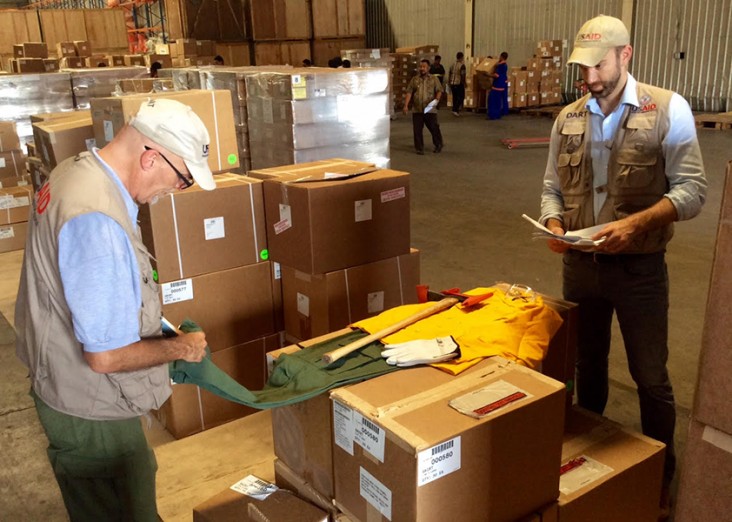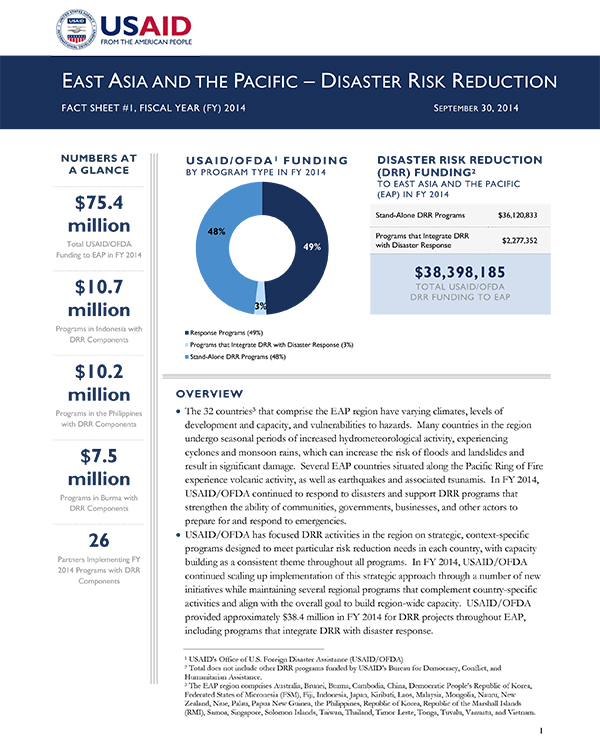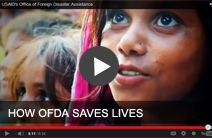- What We Do
- Agriculture and Food Security
- Democracy, Human Rights and Governance
- Economic Growth and Trade
- Education
- Ending Extreme Poverty
- Environment and Global Climate Change
- Gender Equality and Women's Empowerment
- Global Health
- Water and Sanitation
- Working in Crises and Conflict
- Disaster Assistance
- Political Transition Initiatives
- Conflict Mitigation and Prevention
- Countering Violent Extremism
- Disaster Risk Reduction
- Peacebuilding and Reconciliation
- Providing Safe & Secure Environments for Development
- Recovering From Crisis
- Resilience
- Tech Challenge for Atrocity Prevention
- World Humanitarian Day
- U.S. Global Development Lab

Latest Indonesia Fact Sheet
Key Developments
Impacts of the El Niño climate phenomenon on global weather patterns contributed to drought conditions and forest fires in Indonesia in 2015. An estimated 425,000 people had developed acute respiratory tract infections as of October 2015 due to haze and smoke pollution produced by the forest fires, according to the UN World Health Organization. The pollution—most severely affecting Kalimantan Region and Sumatra Island—contributed to at least seven deaths and caused multiple flight cancellations and school closures. A thick haze resulting from the fires also spread to areas in neighboring Malaysia, Singapore, and Thailand. In addition, drought conditions affected 16 of Indonesia’s 34 provinces, resulting in lower-than-expected crop harvests.
On October 22, U.S. Ambassador Robert O. Blake, Jr., declared a disaster due to the effects of the drought and forest fires. In response, USAID’s Office of U.S. Foreign Disaster Assistance (USAID/OFDA) initially provided $150,000 through USAID/Indonesia to the American Red Cross to address immediate health needs among disaster-affected populations. USAID/OFDA subsequently provided more than $1.5 million in firefighting assistance through the U.S. Forest Service, including 5,000 sets of fire safety equipment, protective clothing, and tools. Combined with further assistance from USAID/Indonesia, the U.S. Government provided nearly $3 million in total for the Indonesia fire response as of October 2015.
Background
Indonesia is one of the world’s most disaster-prone countries and regularly experiences drought, earthquakes, flooding, landslides, tsunamis, and volcanic eruptions. Recent major disasters include the eruption of Mt. Merapi in 2010—which resulted in at least 386 deaths and displaced more than 300,000 people—and the Indian Ocean Tsunami of 2004, which caused widespread destruction and more than 130,000 deaths in Indonesia. When disaster strikes, USAID/OFDA works with national and local government officials, civil society, and humanitarian partners to meet humanitarian needs and complement government relief efforts. USAID/OFDA also supports a number of initiatives in Indonesia to improve the capacity of government officials, non-governmental organizations, and local communities to prepare for and respond to disasters.









Comment
Make a general inquiry or suggest an improvement.